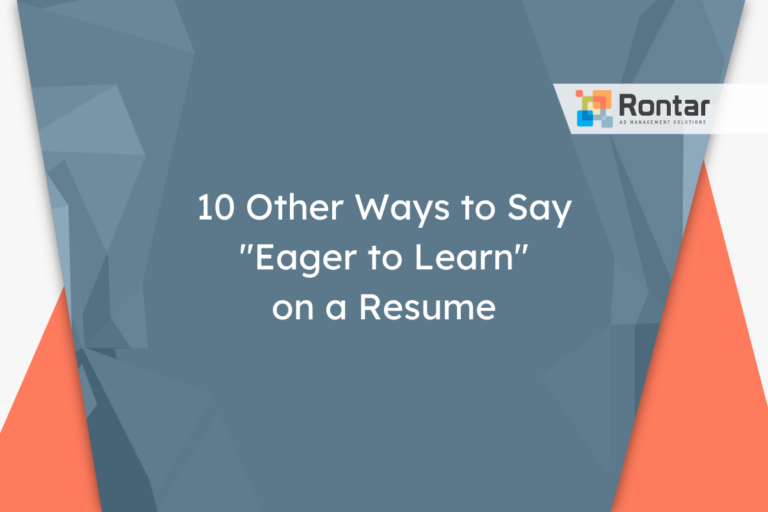10 Synonyms for “Step Out of My Comfort Zone”

Stepping out of your comfort zone is a common way to talk about pushing yourself to grow. But, using the same phrase over and over can get boring and doesn’t always capture what you’re trying to say.
This article introduces ten alternative phrases that can add variety and precision to your resumes and essays. Each one offers a fresh take on personal growth and challenges.
Is It Professional to Say “Step Out of My Comfort Zone”?
In the professional world, clarity and precision are key, so whether it’s okay to use the phrase “step out of my comfort zone” on a resume or in an essay depends on the context. This phrase can showcase your willingness to challenge yourself and grow. It is most effectively used when describing specific situations where you pushed your boundaries to achieve a goal or learn something new.
For example, in a resume, you might use this phrase when detailing a project that required skills you had to learn quickly or a situation that demanded adaptability and resilience.
In my previous role, I had to step out of my comfort zone by taking on a leadership position in a project outside of my usual technical expertise, leading to a successful launch.
Let’s look at the pros and cons of this phrase:
Pros:
- Shows willingness to learn and adapt
- Highlights personal growth and resilience
- Illustrates your ability to tackle challenges head-on
Cons:
- Overused and may seem cliché
- Lacks specificity without further explanation
- May not fully convey the depth of the challenge you faced
While “step out of my comfort zone” is a widely understood phrase indicating growth and adaptability, someone might want to consider using an alternative phrase. This is especially true if they want to stand out or convey their experiences more precisely. In some situations, a synonym or an alternative phrase could better highlight the specific nature of the growth or challenge faced.
Choosing the right words can make your experiences resonate more with the reader, offering a clearer picture of your professional journey.
10 Other Ways to Say “Step Out of My Comfort Zone”
Looking for a fresh way to express personal growth and adventure on your resume or in an essay? Here’s a list of alternatives that can give your language a boost:
- Pursue personal growth
- Embrace challenges
- Seek new experiences
- Expand my horizons
- Push my boundaries
- Challenge myself
- Venture into the unknown
- Explore uncharted territory
- Break out of my routine
- Test myself
1. Pursue personal growth
To “pursue personal growth” suggests a proactive approach to self-improvement and development. It shares similarities with the original phrase by emphasizing the act of moving beyond one’s current capabilities or understandings. This alternative is broader and can encompass both personal and professional realms.
This phrase is especially suited for contexts that require a more formal or professional tone. It suggests a continuous, lifelong process that is appealing in many professional settings, highlighting an individual’s commitment to bettering themselves over time.
Here are examples of how you might use “pursue personal growth”:
As part of my journey to pursue personal growth, I enrolled in advanced language courses to enhance my communication skills.
To pursue personal growth, I volunteered for projects that were outside my usual area of expertise.
2. Embrace challenges
“Embrace challenges” indicates an open and willing attitude towards facing difficulties. This alternative focuses on the attitude toward challenges rather than the act of moving beyond comfort zones. It implies resilience and a positive outlook towards obstacles.
It works well in scenarios where you want to highlight your readiness to tackle difficult tasks with enthusiasm. It’s more informal than the original phrase but maintains a professional spirit, making it great for motivational and personal development contexts.
Let’s look at a couple of examples:
I continuously look to embrace challenges, taking on projects that test my problem-solving skills.
By choosing to embrace challenges, I learned to lead my team through complex software upgrades with confidence.
3. Seek new experiences
This synonym focuses on the pursuit of novelty and learning through doing things one hasn’t done before. Unlike the original phrase, it highlights the action of searching out opportunities for growth rather than the more passive act of stepping aside.
When aiming to portray oneself as proactive and eager to learn, “seek new experiences” is a more polite and professional alternative. It’s perfect for essays or resumes that aim to highlight an adventurous spirit and a willingness to learn from diverse scenarios.
Here are two sample uses:
I always strive to seek new experiences, leading me to volunteer for international projects.
My career is a testament to my desire to seek new experiences, as evidenced by my diverse range of roles across different industries.
4. Expand my horizons
When you “expand my horizons,” you’re seeking to broaden your understanding, skills, or experiences. This alternative is more poetic and metaphorical compared to the straightforward nature of stepping out of your comfort zone. It conveys a desire for comprehensive growth.
This expression is particularly suited when discussing intellectual, cultural, or personal growth. It maintains a formal and professional tone, making it appropriate for use in both professional documents and personal essays. It suggests an uplifting, optimistic approach to growth.
Here are some examples:
I took a sabbatical year to travel, aiming to expand my horizons and understand global business practices better.
Joining the debate club was a part of my effort to expand my horizons and enhance my public speaking skills.
5. Push my boundaries
This alternative emphasizes actively forcing oneself beyond the limits of what is comfortable or known. It’s similar to “step out of my comfort zone” but with an added intensity, suggesting a vigorous, perhaps even aggressive, approach to personal development.
“Push my boundaries” is excellent for contexts that require showcasing determination and the willingness to go beyond standard expectations. It’s slightly more informal yet can be equally professional, depending on the context. This phrase is particularly effective in narratives of overcoming substantial challenges.
Consider these examples:
In a highly competitive industry, I continuously push my boundaries to stay ahead of technological advancements.
To become a better leader, I push my boundaries by engaging in tough conversations and decision-making processes.
6. Challenge myself
Comparing “challenge myself” to “step out of my comfort zone” shows that the former focuses more on personal growth and overcoming obstacles. It’s a direct way of saying you’re ready to take on tasks that push your limits. This alternative is more personal and implies a proactive approach to development.
This phrase is better suited for situations where you want to emphasize self-improvement and the willingness to face difficulties head-on. It’s professional yet intimate, making it ideal for cover letters or personal development plans.
Here are two examples:
Challenge myself by leading a project outside my expertise.
Taking an advanced course to challenge myself and expand my skills.
7. Venture into the unknown
“Venture into the unknown” suggests a bold move towards something new and unfamiliar, much like “step out of my comfort zone.” However, it adds an adventurous spin, highlighting the excitement of exploring new areas. This alternative is more dynamic and evocative.
It shines in contexts where there’s an element of risk or exploration involved. For narratives or essays that aim to capture the thrill of discovery or the courage to face uncertainty, it’s informal yet impactful.
Sample sentences:
Decided to venture into the unknown by traveling solo to a foreign country.
Joining a startup to venture into the unknown and learn from ground zero.
8. Explore uncharted territory
Similar to “step out of my comfort zone,” “explore uncharted territory” suggests going beyond familiar boundaries, but with an emphasis on discovery and exploration. This synonym is more imaginative, painting a picture of exploration and innovation.
This expression is well-suited for scenarios where creativity and innovation are highlighted. When discussing research, creative projects, or entering new markets, it’s a formal and evocative choice.
Here are two samples:
Decided to explore uncharted territory by incorporating AI in traditional manufacturing.
Writing a novel to explore uncharted territory in science fiction.
9. Break out of my routine
“Break out of my routine” directly addresses the idea of changing one’s usual patterns or habits, much like “step out of my comfort zone.” This alternative is more casual and straightforward, making it accessible for a wide audience.
It’s particularly effective when you wish to convey a shift in daily habits or the need for change in a personal journey. Its polite yet informal tone makes it suitable for personal blogs, lifestyle articles, or informal essays.
For example:
Started a new hobby to break out of my routine and meet new people.
Switching to a standing desk to break out of my routine and improve my health.
10. Test myself
The phrase “test myself” is akin to “step out of my comfort zone” in that it implies a self-imposed challenge to gauge one’s abilities or limits. This alternative is more direct and focused on assessment. It’s great for expressing a desire to validate one’s capabilities.
This phrase perfectly fits when aiming to highlight self-evaluation or the pursuit of excellence. It’s professional and precise, making it ideal for contexts like professional development or academic testing.
Examples of use:
Entered a marathon to test myself against the best.
Enrolling in an advanced mathematics course to test myself.
Final Thoughts
Choosing the right way to express growth and willingness to face challenges is key, especially in professional settings like resumes or personal essays.
The ten alternatives provided can help you stand out and convey your message more precisely. Each phrase has its unique flair and context in which it shines the most. By selecting the one that best fits your experiences, you’re not only enhancing your language but also giving a clearer picture of who you are and what you strive for.






